Here is your ultimate guide for how to cook bulgur wheat perfectly every time! Nutty and chewy, bulgur wheat is one of my favorite super grains used often in Mediterranean cooking. It’s nutritious, versatile, and super easy to cook.
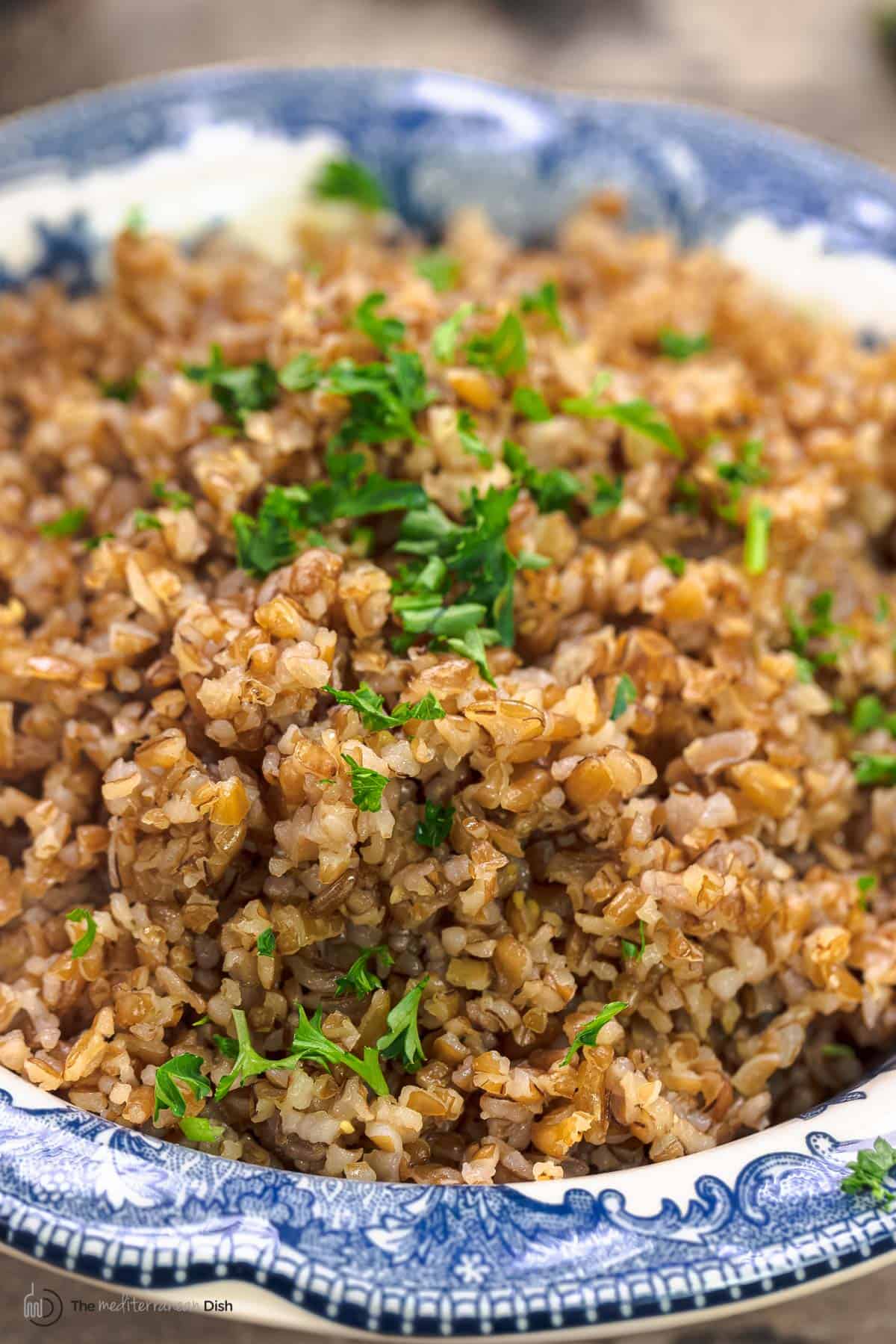
If you’ve made my tabouli recipe, you’re likely already familiar with bulgur wheat. But, this unassuming super grain is a Mediterranean diet staple, and it works well in a variety of dishes, adding texture and nutrition. You can find my favorite bulgur wheat options here. And once you learn how to cook bulgur wheat correctly, you’ll be making it on the regular!
In this post:
- Bulgur wheat
- Types of bulgur wheat
- Is bulgur wheat gluten free?
- How long does it take to cook?
- What is the ratio of water to bulgur?
- Yield
- How to cook bulgur wheat
- How to cook fine bulgur
- Storage tips
- How long does cooked bulgur last?
- Where to find bulgur wheat?
- Ways to use bulgur wheat
- More questions about this grain
- Bulgur recipes to try
Bulgur wheat
Bulgur is an ancient Mediterranean whole grain made from hard red winter wheat berries that have been processed to break down some of the outer layer. Because it is typically par cooked, bulgur doesn’t take much time to prepare; it’s usually ready within 12 to 25 minutes, depending on the coarseness (we’ll get into this more later).
This nutty, chewy, earthy grain is a Mediterranean diet staple most commonly known as a key ingredient in tabouli (tabbouleh), a popular Mediterranean salad made with loads of chopped parsley, bulgur wheat, tomatoes and fresh herbs. It packs a big nutritional punch, including fiber and protein. I love using it in many ways, as a simple side instead of rice, or to bulk up soups and stews, to make Turkish-style vegan “meat”balls, Chicken Stuffed Peppers, and more!
If you haven’t tried this grain before, take my bulgur wheat recipe as a sign! I’m sharing all the tips and tricks for how to cook bulgur wheat – you won’t believe how easy it is. Once you figure out what type of bulgur works best for you, you can get cooking right away.
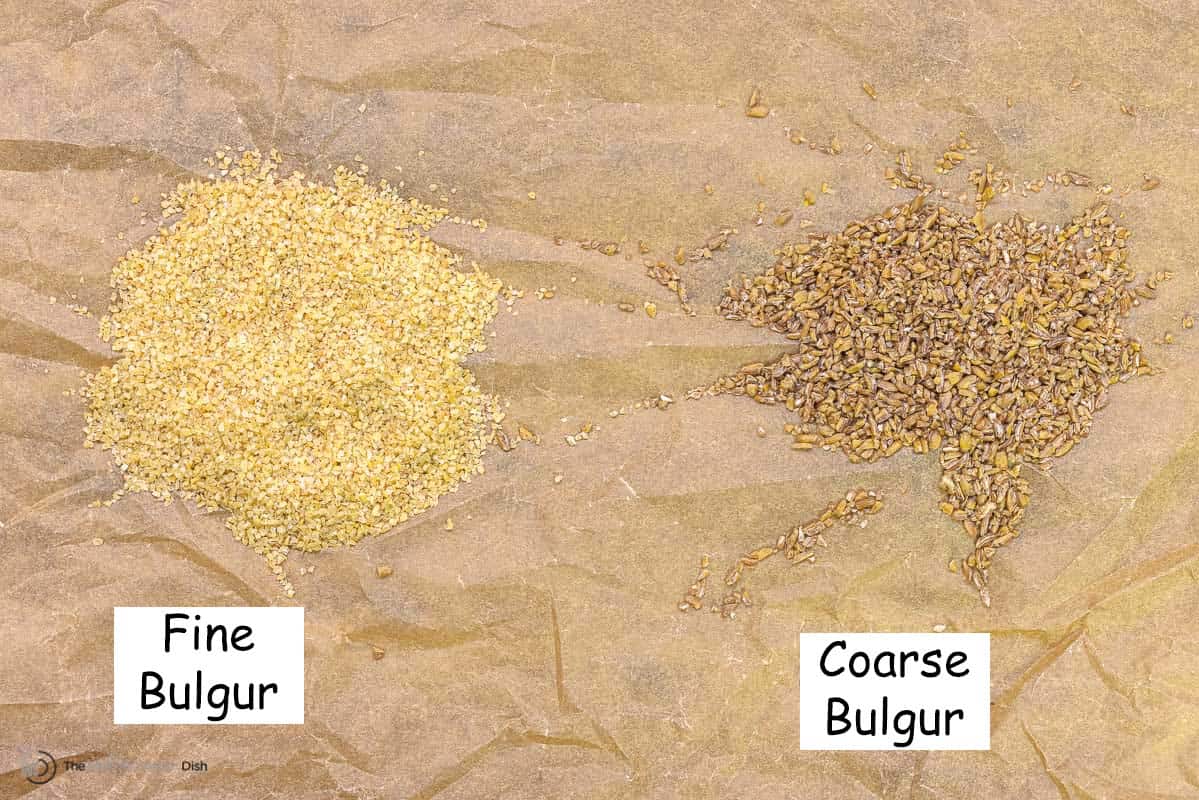
Types of bulgur wheat
There are 4 main types of bulgur grains: fine, medium, coarse, and extra coarse. Fine and coarse bulgur are my favorites because I can use them in totally different ways in my cooking.
Fine bulgur has a texture similar to couscous, it is a quick-cooking grain that does not need to be boiled. Soaking it for a few minutes in hot water is all it takes (more tips below!). Coarse bulgur wheat, on the other hand, is a whole grain you can cook on the stovetop with just a bit of liquid and a pinch of salt. Both types are easy and unfussy to prepare in just minutes.
Is bulgur wheat gluten free?
Bulgur wheat is not gluten-free, and should be avoided by those who follow a gluten-free diet. Brown rice is the most similar gluten-free substitute, and quinoa would also work (though it tastes quite different).
How long does it take to cook?
Cooking bulgur wheat doesn’t take much time at all. Coarse bulgur will need to boil in water or broth on the stove for 12 minutes or so, until it’s tender and all the liquid is absorbed. You should then let it stand for 10 minutes, covered and undisturbed, for perfectly fluffy, tender bulgur with a pleasant chewy texture.
Fine bulgur wheat doesn’t need to be cooked at all, and can be soaked in hot water in a heat-safe bowl for 10 to 15 minutes.
What is the ratio of water to bulgur?
Unlike cooking lentils, the ratio of water to grain is what makes a big difference in cooking. For tender coarse bulgur so that it is perfectly tender and fluffy. To cook 1 cup of dry coarse bulgur wheat, you’ll need 1 ½ cups of liquid. per cup of dry bulgur. Water, chicken broth, or vegetable broth are my favorite liquids for cooking bulgur.
To soak 1 cup of fine bulgur, you’ll need 2 cups of liquid (remember, you do not need to cook fine bulgur for things like tabouli, you simply soak it until it is tender and fluffy). Double the amount of hot liquid for every cup of dry bulgur.
Yield
Like barley, 1 cup of dried bulgur wheat grains yields 3 cups of fluffy cooked bulgur.
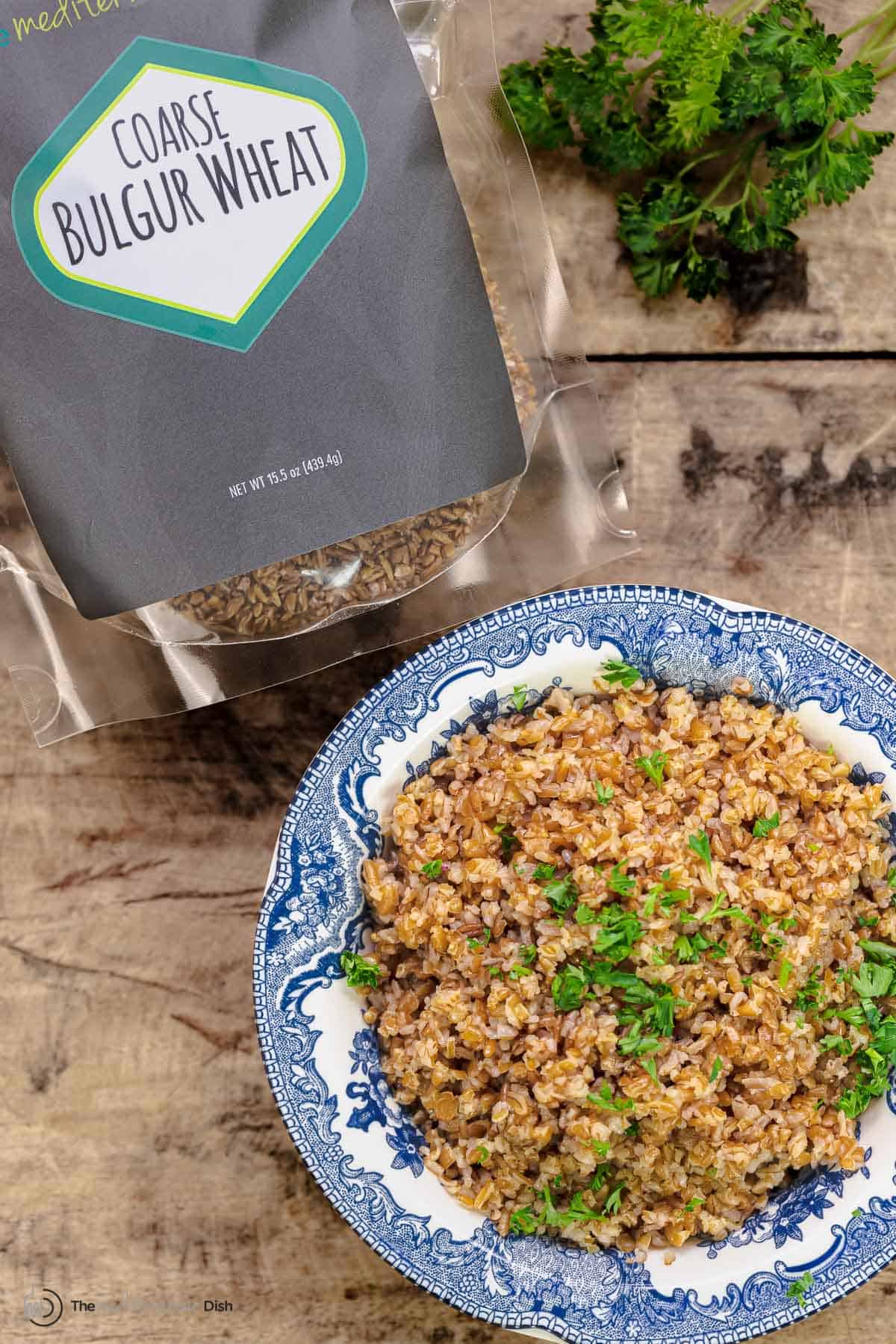
How to cook bulgur wheat
This bulgur wheat recipe is as simple as rinsing, boiling, and fluffing! Here’s how to cook coarse or medium bulgur (see below for how to prep fine bulgur!):
- Rinse. Rinse 1 cup of bulgur and drain well.
- Cook the coarse bulgur wheat. Bring 1 1/2 cups of low-sodium broth (or water) to a boil in a medium saucepan. Stir in the drained coarse grind bulgur and 1 tablespoon olive oil (optional). Season with a big pinch of kosher salt. Once the liquid bubbles again, lower the heat. Let it simmer, covered, for about 12 minutes. The bulgur should be tender, and there should be no liquid left. Remove from the heat and let it stand (covered) for 10 minutes.
- Fluff and serve. Fluff with a fork and garnish with parsley before serving.
How to cook fine bulgur
Fine bulgur, also known as quick-cooking bulgur, does not typically require cooking on the stovetop, since the grains are too small. Instead, you simply need to soak it in water until tender and ready to use. Here is how:
- Place 1 cup of dry fine bulgur grains in a large bowl. Pour 2 cups of hot water on top.
- Set it aside for 10 to 12 minutes to soak. Once the bulgur has soaked all the water, you can fluff it and serve it or use it in tabouli or otherwise.
Storage tips
Store dry bulgur in an airtight container away from heat, light, and moisture. An unheated pantry is ideal. If stored correctly, dry bulgur wheat will keep for around 2 years! You can also freeze it, which increases its lifespan significantly.
How long does cooked bulgur last?
Cooked bulgur will keep in an airtight container in the refrigerator for up to 4 days. It can also be frozen in a freezer-safe container or bag for up to 3 months. To reheat refrigerated bulgur, add the bulgur to a saucepan with a little water over medium heat until warmed through. For frozen bulgur, thaw it overnight in the fridge first and then follow the method above.
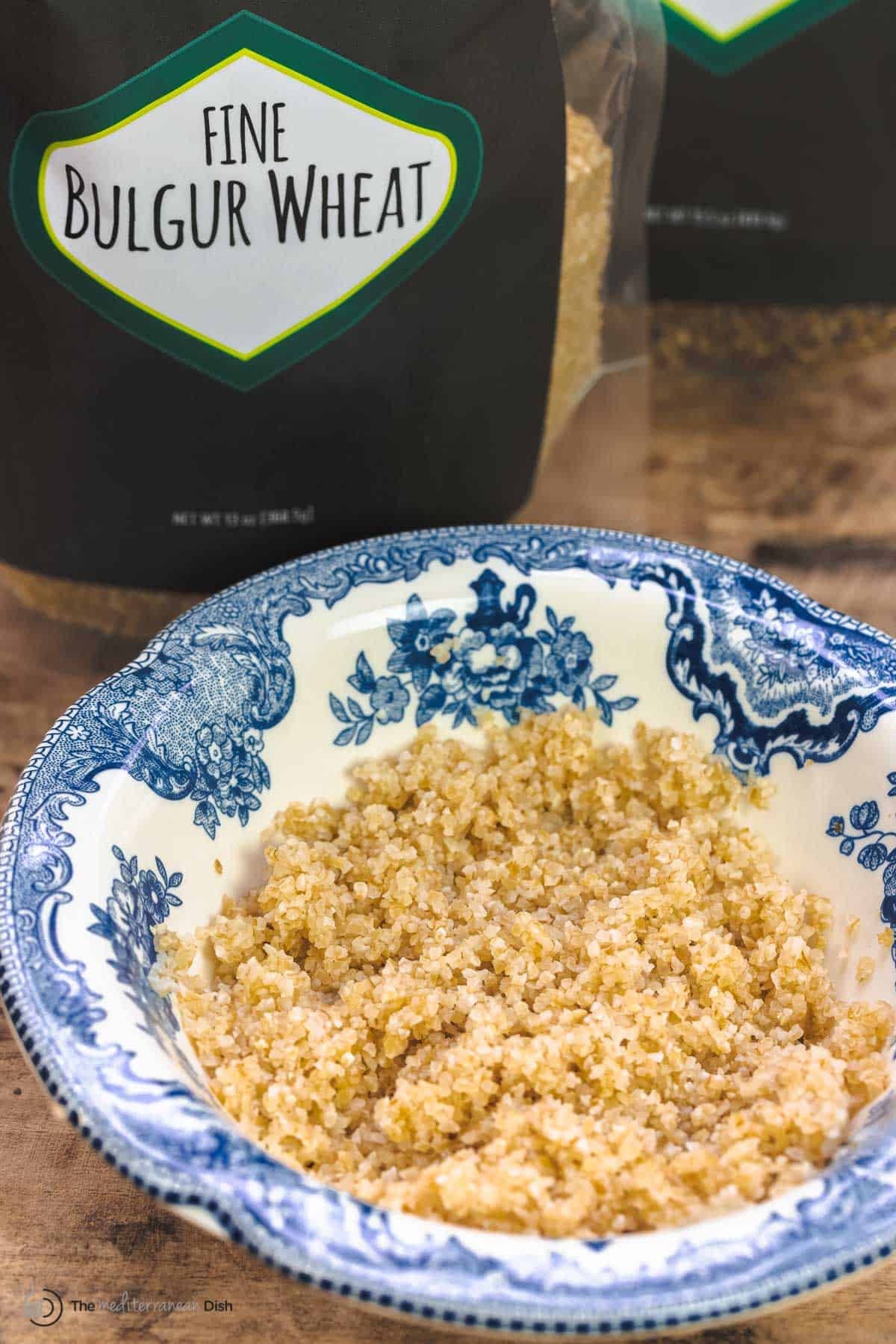
Where to find bulgur wheat?
My favorite bulgur wheat can be found in our online shop. You can find both coarse and fine bulgur wheat, delicious in anything from tabouli to salads to soups and stews! I love the chewy texture and nutty flavor of our bulgur wheat.
Alternatively, you can find bulgur wheat in your local grocery store. It’s most likely near the rice and other grains or in the international foods section. If your local grocery store does not carry it, try health food stores.
Ways to use bulgur wheat
Bulgur is an incredibly versatile grain! Coarse bulgur makes a delicious pilaf. It’s also an easy way to add some heft and nutrition to soups, stews, and casserole dishes. Coarse bulgur wheat can typically be used in any recipe that calls for brown rice – they’re quite similar in taste and texture.
Fine bulgur can be used in almost any recipe that calls for couscous. I like to make my chicken couscous and shrimp and chorizo recipes with fine bulgur wheat for a little different flavor. Fine bulgur is also used in tabouli, a popular Mediterranean salad, and Kisir (Turkish Bulgur Salad). If you’re craving some comfort food, try kibbeh or my warming stuffed eggplant!
Because of its mild nutty flavor, bulgur also makes a nutritious side dish next to your favorite protein, like baharat baked chicken thighs, spicy salmon, or braised leg of lamb.
More questions about this grain
Bulgur is really nutritious! It’s a good source of fiber and protein, and is also rich in vitamins and minerals, like manganese, copper, and magnesium.
All types of bulgur wheat do not need to be soaked prior to cooking.
Bulgur recipes to try
Browse all Mediterranean Recipes
Visit Our Shop
How to Cook Bulgur Wheat
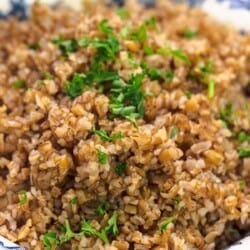
Ingredients
For medium or coarse bulgur
- 1 cup bulgur wheat, medium-coarse or coarse
- 1 ½ cups broth or water
- 1 tablespoon olive oil, optional
- Kosher salt
- Parsley for garnish
For fine bulgur
- 1 cup fine bulgur wheat
- 2 cups hot water or liquid
- Kosher salt
Instructions
To cook medium or coarse bulgur
- Rinse 1 cup of bulgur and drain well.
- In a medium saucepan, bring 1 1/2 cups of low-sodium broth (or water) to a boil. Stir in the drained bulgur and olive oil (if using). Season with a big dash of kosher salt.
- Allow the liquid to bubble again, then turn the heat down. Cover and let simmer for about 12 minutes or until the bulgur is tender and has fully absorbed the liquid.
- Remove from the heat and let stand, covered, for another 10 minutes (leave it alone).
- Fluff with a fork and garnish with parsley before serving.
To cook fine bulgur
- Place 1 cup of dry fine bulgur grains in a large bowl. Pour 2 cups of hot water on top.
- Set it aside for 10 to 12 minutes to soak. Once the bulgur has soaked all the water, you can fluff it and serve it or use it in tabouli or otherwise.
Video
Notes
- Is bulgur wheat gluten-free? No, and it should be avoided by those following a gluten-free diet.
- Yield: 1 cup of dried bulgur wheat grains yields 3 cups of fluffy cooked bulgur.
- You can add your favorite seasonings and aromatics to flavor your bulgur. To do so, add the seasonings to the cooking water. Once cooked, taste and adjust to your liking.
- Storage: Store dry bulgur in an airtight container away from heat, light, and moisture. An unheated pantry is ideal. If stored correctly, dry bulgur wheat will keep for around 2 years! You can also freeze it, which increases its lifespan significantly.
- How long does cooked bulgur last? Cooked bulgur will keep in an airtight container in the refrigerator for up to 4 days. It can also be frozen in a freezer-safe container or bag for up to 3 months.
- Visit our Shop to browse Mediterranean ingredients including extra virgin olive oils, grains (like coarse and fine bulgur wheat), and more!
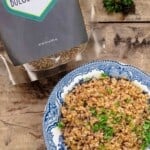

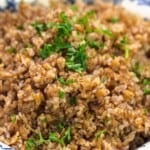
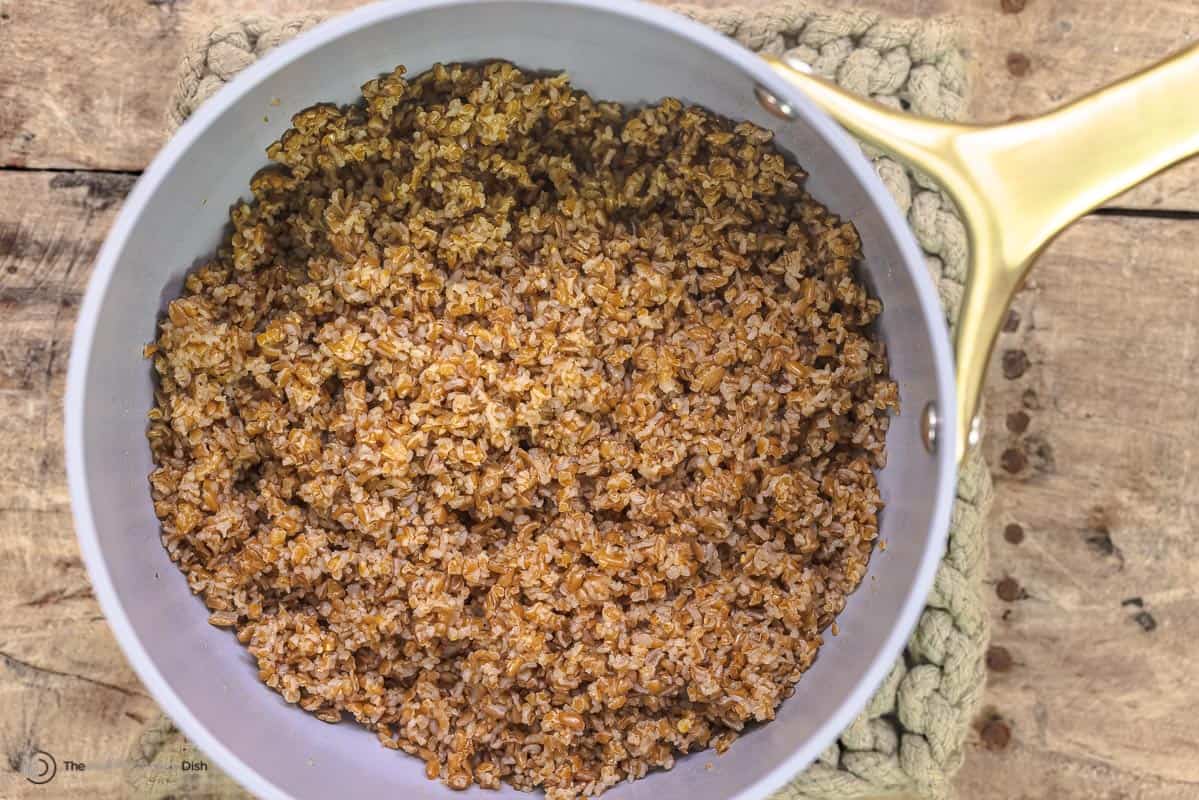
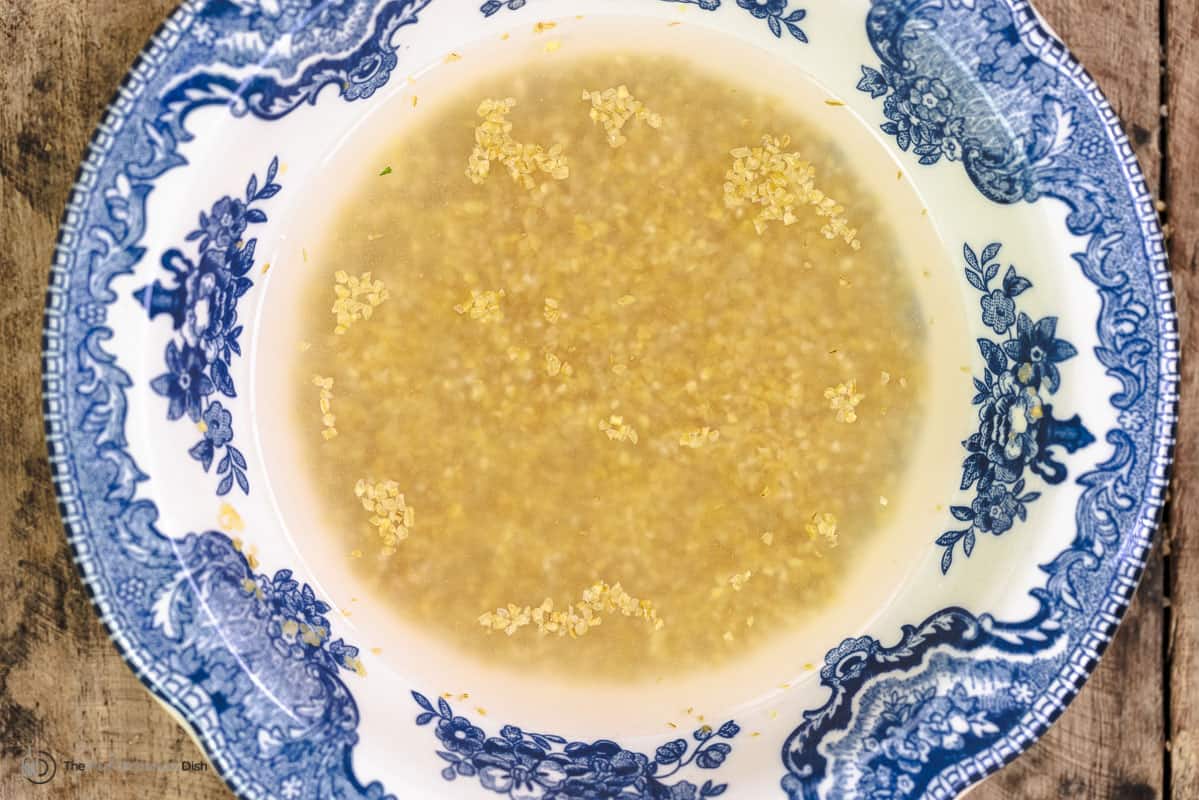
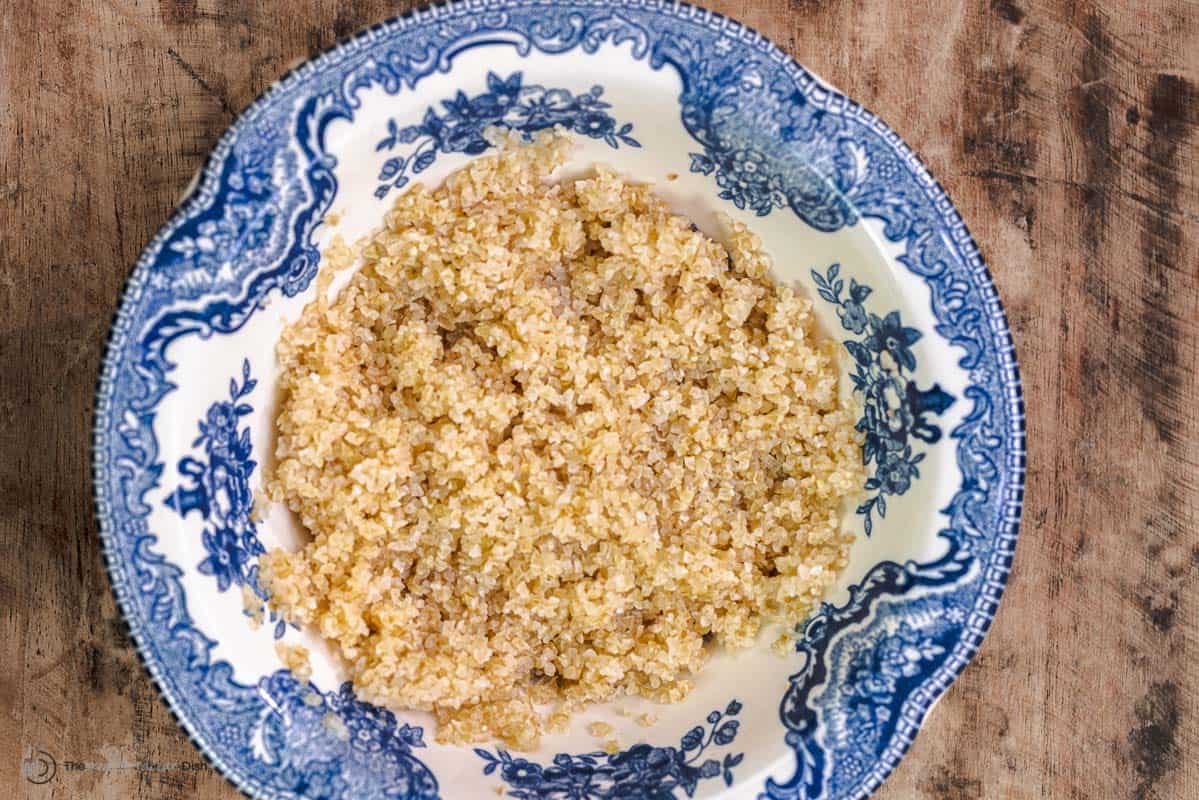
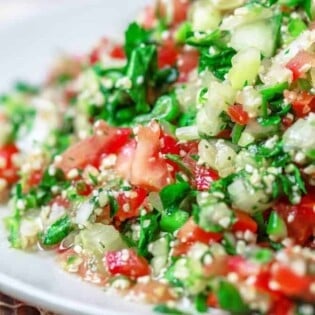
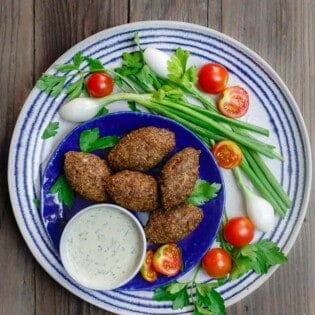
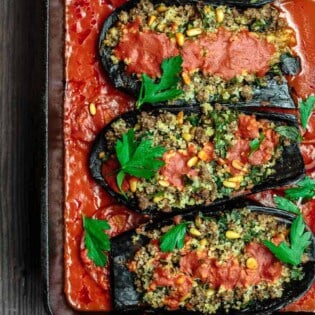
Made (and tasted) bulgur for the first time ever and my mom and I loved it! Served it with lemon chicken and baked cabbage steaks for meal prep. The olive oil gave it a wonderfully smooth texture. I will be making it again. THANK YOU!!! <3
Yay! This Kisir is another amazing bulgur recipe I highly recommend!
Thanks so much for this! My husband was recently diagnosed with type 2 diabetes and we’re looking for new recipes and food options for him, so I’m really glad to find your site and this info. I was wondering – could you prepare bulgur in a rice cooker?
Hi, Juli. I believe you can, but it’s not something we’ve tried before here.
Hello Suzy,
A while back maybe the mid 70’s we used to make it by first roasting it at least that is what we called it by putting the oil in the skillet on medium low heat until it shimmered then adding the bulgar till you smelled it roast then add the liquid and cover but we also added sauteed aromatics like garlic and or onion also mushroom and sometimes red/yellow/orange bell pepper, Have you ever had it that way?
Very interesting! We’ve never tried it that way over here. Thanks for a bit of inspiration!
Now that is taking it up another level….I tried that today and the flavour went up another notch…Merci Beaucoup
Helpful clear directions. Thanks
I loved it! It was my first time cooking and eating bulgur. It was simple enough to make and absolutely delicious. It’s a bit like brown rice, but heartier and a deeper flavor. I made it a long with baked chicken, broccoli and beets. I know it doesn’t sound very exciting but when put together it was very satisfying and tasty. I have some left over bulgur that I plan on tossing into a pot of soup tomorrow. I hope that works out well 😉
Welcome to the world of bulgur, Amanda!! I highly recommend using it in our tabouli salad recipe… such a classic!
Came out really very wonderful! Thank you 🙏🏾!
I love your site! i noticed that you said to add 2 cups of hot water to one cup of fine bulgur, but I’ve always used a 1-1 ½ ratio. Is this a typo? the instructions are under How To Cook Fine Bulgur, and reads: “ Place 1 cup of dry fine bulgur grains in a large bowl. Pour 2 cups of hot water on top.” Also, I cannot edit comments by Re selecting text and adding/deleting; I can only go backwards and delete…something for your web person.
Hi, CJ! This is the ratio that worked for us during testing using our own fine bulgar wheat. If you have been successful with 1:1.5 cup ratio, though, then you can totally go ahead and stick with that.
I’m new to this website but looking forward to preparing many of these delicious looking meals. Many of the ingredients are some of my favorites!
What is bulgur from rice?
Hi, Teknik. Bulgur is just a different type of grain.
I’ve been to morocco and discovered to bully there. This recipe is perfect! Thank you!
Thanks for the great recipe. I’m an old man native to the U.S., but for cooking I use a digital scale and metric measurments, the former because it’s easier to just add the ingredients with a bowl on the scale, and the latter because they’re more sensible and easier to use. For this reason, I’d find it very convenient if you’d provide those measurements in addition to the imperial ones you already provide. Surely, I’m not the only one.
Hi, Allen. Thanks for the feedback! It is something we are trying to add more and more, starting with our baking recipes. It’s just quite a process, and we are a small team :). We’ll keep working on it, though.
Sorry I am confused!
You wrote ‘To cook 1 cup of dry coarse bulgur wheat, you’ll need 1 ½ cups of liquid.”….Do you mean 1and half cups of liquid or Half cup of liquid to 1 cup?
Best wishes from Thailand!🎄💖
Hi, Hash. You will need 1 cup of bulgar and 1.5 cups of water or broth for this recipe. Enjoy!
Despite having no Mediterranean roots, I’ve eaten bulghur since childhood and enjoy it however it’s cooked. My mother learned of it, perhaps from an Armenian women, in the early 1950’s in Seattle, and her method started with sauteeing onions in oil, then adding the dry bulghur and stirring it for a couple of minutes in the oil to coat and slightly toast it, then adding broth or water and put it in the over to bake until the liquid was absorbed. Does this metghod come from a particular area of group?
Sounds good….I will do this… Thank you!… Good day from Thailand!
This is a super helpful article! I’ve always wanted to try bulgur, and my first attempt at preparing it was a success :).
Awesome! Thanks, Lauren!
My first time cooking bulgur! It was so easy!
So glad to hear it! Thanks, Ania!